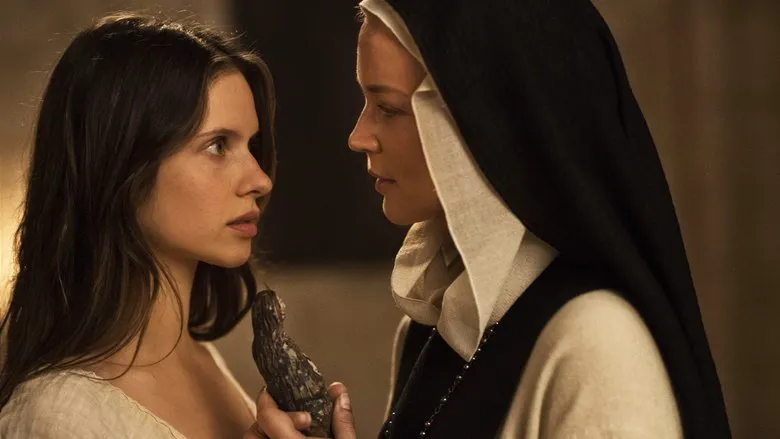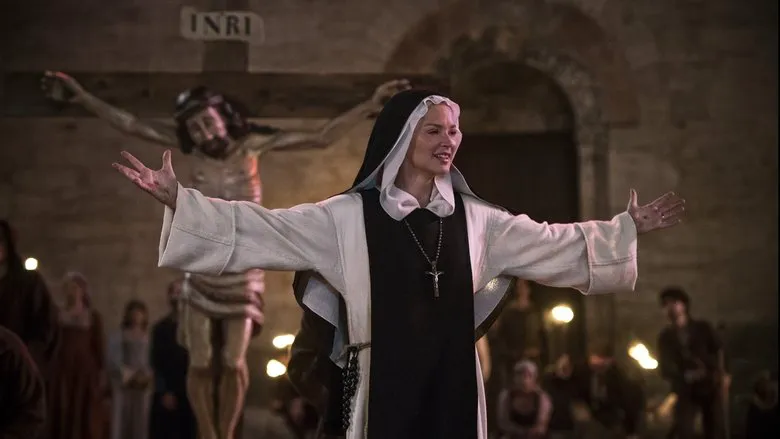Benedetta: A Provocative Exploration of Faith, Power, and Desire
Costume dramas centered on lesbian love often fall into predictable patterns: rustling fabrics, lingering gazes on bodies, and ponderous pronouncements about freedom. However, Benedetta, originally titled Temptation, is directed by Paul Verhoeven, the filmmaker renowned for the sexually charged thriller Basic Instinct (1992) starring Sharon Stone. Basic Instinct presented a hyper-sexualized vision of passion, a world away from reality and teetering on the edge of pornography. The director’s “male gaze” was evident in the objectified portrayal of women: impeccably styled hair, meticulously groomed bodies, and flawless makeup were always a must.

Virginie Efira as Benedetta Carlini in a scene from the film “Benedetta”
Verhoeven’s heroines are often femme fatales, dangerous figures who tempt those who get too close. The bisexuality of Stone’s character can also be seen as a product of the male gaze, where lesbian sex is not repulsive to men, as sex between men might be, but rather a source of titillation. By the late 2010s, Hollywood had largely moved away from objectified depictions of women, reflecting the global wave of feminism that was reshaping societal consciousness. Several films about love between women emerged, moving it away from the realm of exoticism, including Portrait of a Lady on Fire (2019, Céline Sciamma), Elisa & Marcela (2019, Isabel Coixet), and Ammonite (2020, Francis Lee). These films find female attractiveness not in danger or the masculine drive to “conquer” and “win a prize,” but in sensuality.

Virginie Efira as Benedetta Carlini in a scene from the film “Benedetta”
Challenging Conventions: Verhoeven’s Sensual Turn
Paradoxically, the objectifying Paul Verhoeven also arrives at sensuality in Benedetta. Benedetta (Virginie Efira) is placed in a strict convent as a child, where there is little talk of God but much about money and power. Benedetta is an anti-clerical film that shatters illusions surrounding the sanctity of the church. The church, like any other institution, is a theater where people must play specific roles. Benedetta was a clever girl who grew into a clever woman, a brilliant actress who long convinced everyone that she was communicating with God. She embodied the modern saying “fake it till you make it,” aided by a tincture of poppy seeds given to her during her nightly fits. If the currency of the church is faith, then the richest is the saint, the one “marked” by God. The effect of the potion allowed her to manifest stigmata on her hands and feet, proof of her connection to the heavens through religious ecstasy.

Virginie Efira as Benedetta Carlini in a scene from the film “Benedetta”
Faith, Love, and Rebellion
Benedetta is not canonized but is made the new abbess of the convent. The previous head, Sister Felicità (Charlotte Rampling), saw ambition in Benedetta’s actions, but Benedetta’s real sin is egotism. She believed in her own chosenness, her closeness to God, and transitioned from human self-awareness to divine consciousness. Therefore, worldly sins do not concern her. Benedetta chose love, and the second chosen one after Jesus became Bartolomea (Daphne Patakia), who fled to the monastery from a family of abusers.
Benedetta is based on the documentary work of researcher Judith C. Brown, who studied lesbian practices in the Renaissance era. Paul Verhoeven hardly distorted the facts and made Benedetta an alpha woman. Credit should be given to the director: he never portrayed women as stupid dolls but followed the tradition of film noir, where femmes are beautiful, intelligent, and cunning. Such is Benedetta, who confuses the viewer by the end, as she destroys the line between playing a believer and her ordinary behavior. One thing can be said: Benedetta’s heart belongs to love, which does not end with love for the Lord. Her sexual freedom is a protest against the dogma: “The worst enemy is your body.” Verhoeven declares war on the church, celebrates female beauty, and thus achieves a feminist message in this story. His radical gesture in one of Benedetta’s dreams, where she removes the loincloth from Christ and sees female body parts, is particularly striking. If Ariana Grande wrote the song “God Is a Woman,” then why can’t Paul Verhoeven make a film about it?